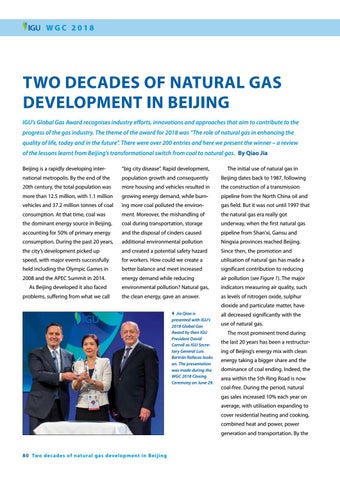WGC 2018
Two decades of natural gas development in Beijing IGU’s Global Gas Award recognises industry efforts, innovations and approaches that aim to contribute to the progress of the gas industry. The theme of the award for 2018 was “The role of natural gas in enhancing the quality of life, today and in the future”. There were over 200 entries and here we present the winner – a review of the lessons learnt from Beijing’s transformational switch from coal to natural gas. By Qiao Jia Beijing is a rapidly developing inter
“big city disease”. Rapid development,
The initial use of natural gas in
national metropolis. By the end of the
population growth and consequently
Beijing dates back to 1987, following
20th century, the total population was
more housing and vehicles resulted in
the construction of a transmission
more than 12.5 million, with 1.1 million
growing energy demand, while burn
pipeline from the North China oil and
vehicles and 37.2 million tonnes of coal
ing more coal polluted the environ
gas field. But it was not until 1997 that
consumption. At that time, coal was
ment. Moreover, the mishandling of
the natural gas era really got
the dominant energy source in Beijing,
coal during transportation, storage
underway, when the first natural gas
accounting for 50% of primary energy
and the disposal of cinders caused
pipeline from Shan’xi, Gansu and
consumption. During the past 20 years,
additional environmental pollution
Ningxia provinces reached Beijing.
the city’s development picked up
and created a potential safety hazard
Since then, the promotion and
speed, with major events successfully
for workers. How could we create a
utilisation of natural gas has made a
held including the Olympic Games in
better balance and meet increased
significant contribution to reducing
2008 and the APEC Summit in 2014.
energy demand while reducing
air pollution (see Figure 1). The major
environmental pollution? Natural gas,
indicators measuring air quality, such
the clean energy, gave an answer.
as levels of nitrogen oxide, sulphur
As Beijing developed it also faced problems, suffering from what we call
dioxide and particulate matter, have c Jia Qiao is presented with IGU’s 2018 Global Gas Award by then IGU President David Carroll as IGU Secre tary General Luis Bertrán Rafecas looks on. The presentation was made during the WGC 2018 Closing Ceremony on June 29.
all decreased significantly with the use of natural gas. The most prominent trend during the last 20 years has been a restructur ing of Beijing’s energy mix with clean energy taking a bigger share and the dominance of coal ending. Indeed, the area within the 5th Ring Road is now coal-free. During the period, natural gas sales increased 10% each year on average, with utilisation expanding to cover residential heating and cooking, combined heat and power, power generation and transportation. By the
80 Two decades of natural gas development in Beijing

















